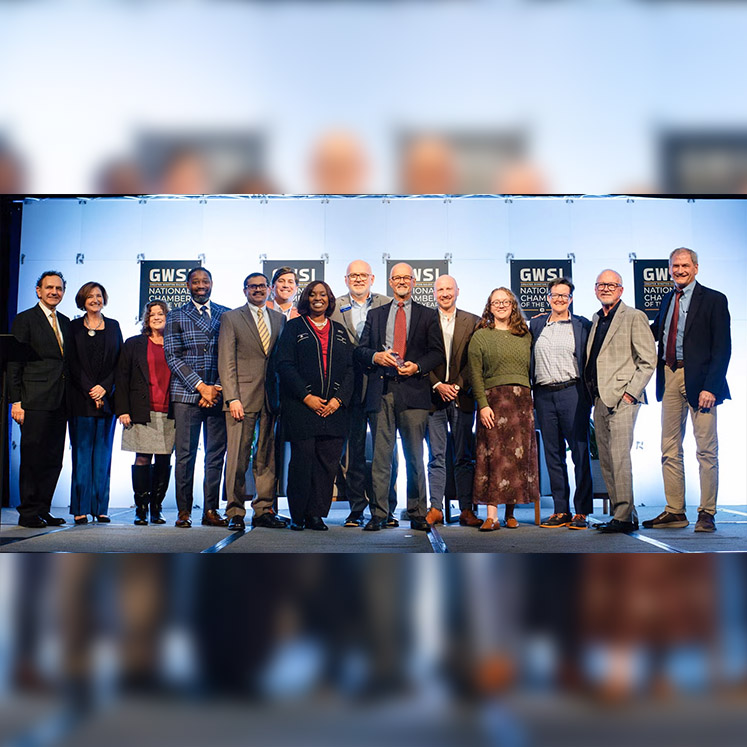Greater Winston-Salem awards WSSU for innovation partnership in regenerative medicine project by National Science Foundation
Winston-Salem State University is among the universities recognized with the “Truliant Collaboration of the Year” award by the Winston-Salem Chamber for its role in the groundbreaking National Science Foundation (NSF) Regenerative Medicine Engine.
This national initiative unites key academic and industry leaders to advance regenerative medicine, a field that uses science and engineering to repair or replace damaged tissues and organs. WSSU joins the Wake Forest Institute for Regenerative Medicine (WFIRM), Forsyth Technical Community College, North Carolina Agricultural and Technical State University (N.C. A&T), Axiom Space, and the Regenerative Medicine Development Organization (ReMDO) as core partners.
Funded through the NSF Engines Program, the collaboration will receive $15 million over the first two years, with potential support of up to $160 million over the next decade. The goal: to speed the development of regenerative medicine technologies from research to real-world application while driving workforce growth and economic opportunity across the Piedmont Triad and beyond.

In its first year, the program has already produced measurable results, including creating more than 50 new jobs in central North Carolina, attracting nearly $300 million in new investments, and providing research, training, and internship opportunities for high school and college students preparing to enter the biotechnology workforce.
As part of the initiative, Innovation, Translation, and Education Cores (ITECs) are being established at partner sites, including WSSU. Each core will focus on a different area of regenerative medicine such as biomaterials, workforce development or in-space manufacturing. These centers will help address pressing technical challenges and train a new generation of scientists and technicians.
Dr. Jill Keith, WSSU’s principal investigator for the NSF Engines program, plays a key leadership role in the effort. She is a biochemistry professor in WSSU’s Department of Chemistry, interim director of the Biomedical Research Infrastructure Center, and an adjunct professor at Wake Forest University Health Sciences.
“This project represents the power of collaboration,” Keith said. “Through partnerships like this, our students and faculty are contributing to groundbreaking research that will shape the future of regenerative medicine and expand opportunities for underrepresented communities in STEM.”
The NSF Engines Program emphasizes inclusivity, ensuring that historically underrepresented populations in science and technology have access to education, training and leadership opportunities through its academic partners WSSU, N.C. A&T, and Forsyth Tech.
“NSF’s investment in innovation in the Piedmont Triad underscores the strength of collaboration between WSSU, WFIRM and N.C. A&T,” said Shawn Holt, associate provost for Research & Innovation at WSSU. “It’s also a testament to Dr. Keith’s dedication to research and to preparing our students for meaningful careers in this rapidly growing field.”
Key areas in which the NSF Regenerative Medicine Engine is driving impact across the region include:- Accelerating innovation: ProKidney, a $500 million regenerative medicine company, has announced a $22.5 million expansion and plans to hire 50 skilled workers in Winston-Salem.
- Growing investment: More than $266 million in new funding and in-kind resources have been secured since the program’s launch in 2024.
- Expanding partnerships: Over 150 industry, academic and community organizations are now part of the network.
- Developing talent: New biotechnology internships and training programs are preparing high school and college students for careers in regenerative medicine.
- Boosting the economy: The upcoming scale-up of regenerative medicine device manufacturing in 2025 is expected to create additional jobs and accelerate delivery of lifesaving products.
NSF Director Sethuraman Panchanathan said the inaugural NSF Engines awards demonstrate a commitment to “create opportunity everywhere and enable innovation anywhere.” He noted that these projects are helping transform entire regions into “world-leading hubs of innovation.”
Wake Forest News contributed to this report.
